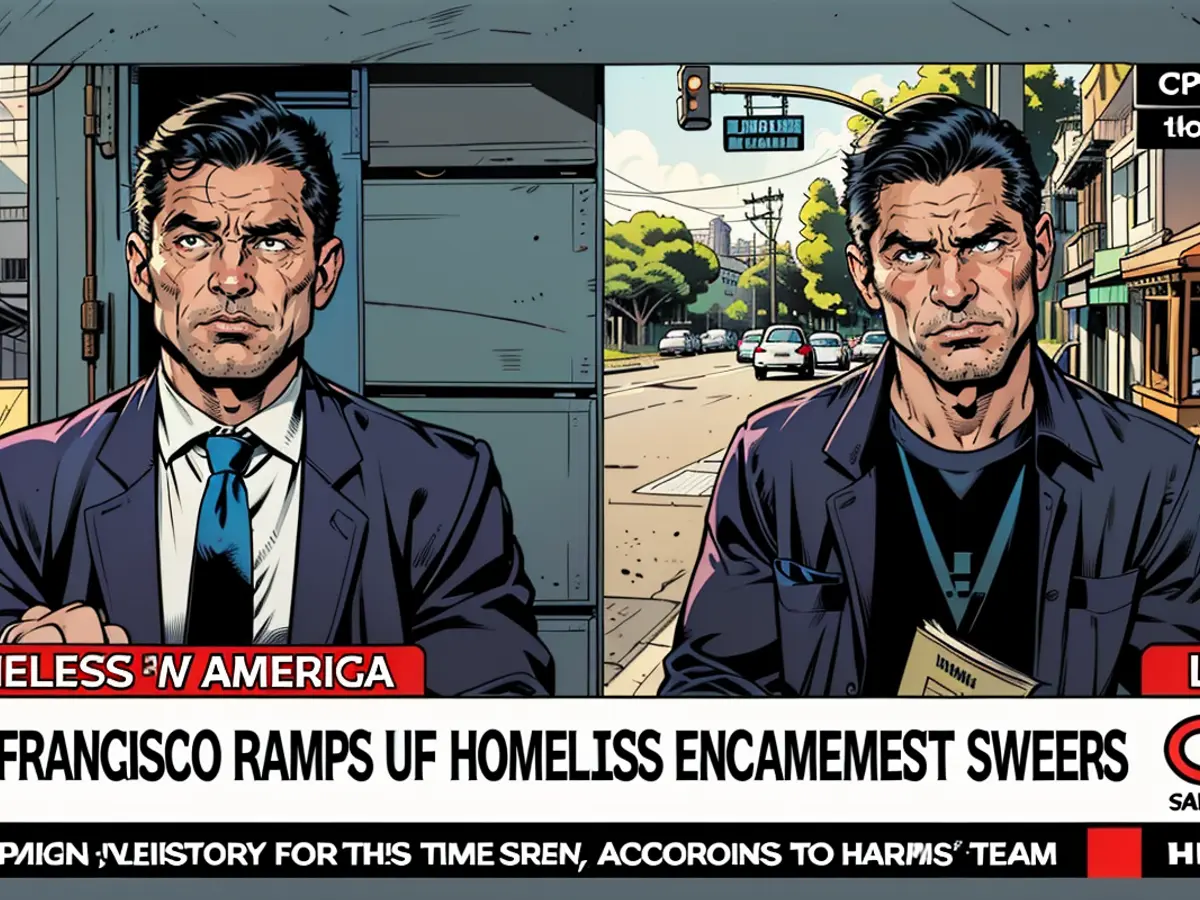Disrupted medication distribution, postponed housing arrangements: The impact of homeless sweeps on Medicaid's objectives
Law enforcement presented him with a predicament: Seek refuge at a shelter or face arrest and charges for sleeping in public.
Douglass was grappling with his decision as he took apart his makeshift shelter. Accepting a temporary shelter could mean missing a vital appointment with his street medicine case manager, scheduled to meet him at his campsite in the morning to assist him in securing low-income housing with support services – and he was concerned about losing his medications, ID, and other vital documents once again during another homeless sweep.
Douglass, lacking a functioning cellphone, was aware that if he relocated, his case manager might struggle to locate him. "I'm almost there. I need to be here tomorrow morning to try and gain entry," he pleaded with the officers, as he was handcuffed and taken into custody for illegal lodging.
California, the focal point of the United States' homelessness crisis, is intensifying its crackdown on those living outside like never before, adopting a stringent approach to breaking up and clearing homeless encampments following a significant U.S. Supreme Court ruling in late June that makes it simpler for government agencies to fine and arrest people for living on streets, sidewalks, broken-down vehicles, and within public parks – even when shelters or housing options are unavailable. From San Francisco to Los Angeles, communities are launching cleanup operations, intensifying enforcement of existing anti-camping laws, and enacting new regulations to prevent people from living outdoors.
In practice, public health experts and homeless service providers argue that the law enforcement crackdown is undercutting the taxpayer investments in evidence-based treatment and housing services being deployed by cities and states nationwide as politicians look to the healthcare system to rapidly remove people from the streets.
The sweeps, which have gained momentum under Democratic Governor Gavin Newsom, who issued an executive order in late July demanding that state agencies eliminate encampments and encouraging local governments to do the same, have plunged homeless individuals into chaos and are disrupting crucial connections with health care providers, social service agencies, and housing coordinators attempting to help them recover and leave the streets.
Newsom's hardline stance is undermining his signature Medicaid initiative, known as CalAIM, which dedicates $12 billion over five years in part to helping homeless people receive healthcare, housing, and social services. The experimental program, designed to stabilize the most vulnerable and prevent low-income patients from entering expensive institutional care such as hospitals, jails, and nursing homes, launched in early 2022 with backing from the Biden administration and provides funding to street medicine teams, hospitals, health insurance companies, community clinics, and other organizations to serve homeless individuals.
This unfolds as Newsom announced this month that his Health Secretary, Mark Ghaly, who has spearheaded the state's investment of social services for homeless people into the healthcare system, would be stepping down.
Encampment clearances are also disrupting long-standing federal healthcare policies that provide billions of dollars annually to street medicine providers, case management teams, and front-line community clinic workers, including through the national "Health Care for the Homeless" program, which aims to help homeless individuals get well and navigate a path to permanent housing.
Newsom has maintained that streets are not a home and that it's unsafe to allow people to live outside amid public health hazards such as rats, drug needles, and piles of trash. The second-term governor, who has threatened to withhold homelessness funding from communities that fail to demonstrate sufficient progress, asserts that his policies are helping secure long-term housing and services for people.
"There are no more valid excuses," Newsom said in July.
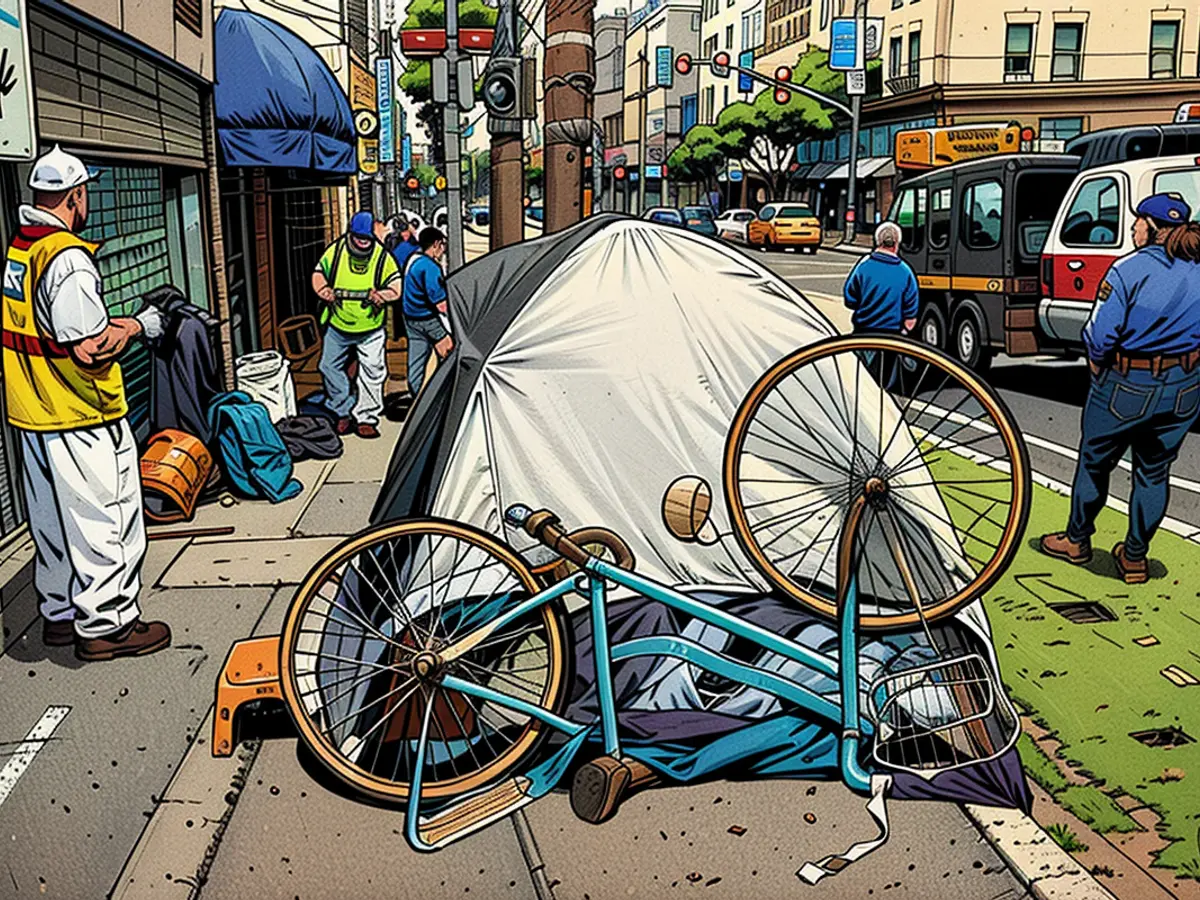
Healthcare providers and homelessness experts argue that the outcome is a slow-moving healthcare catastrophe spawned by the very Democratic politicians advocating for care and services in California, home to the most homeless individuals of any state in the nation.
No place is pushing as hard as San Francisco, a fiercely liberal city that has long celebrated its reputation as a haven for homeless individuals with access to robust services.
Now, case managers, housing navigators, and street medicine teams report that vulnerable individuals are growing sicker amid the crackdown, and many have disappeared. Others have lost medications and essential documents like birth certificates and Social Security cards, setbacks that hinder efforts to stabilize people with housing, mental health services, and addiction treatment. Front-line providers in San Francisco claim the city represents a glaring example of homelessness policy failure.
"All the sweeps and arrests are simply moving people to the next sidewalk and disrupting their continuity of care. It's a colossal waste of resources," said Shannon Heuklom, a primary care provider and expert in street medicine for the San Francisco Community Health Center, with a clinic situated in the heart of the Tenderloin.
"A portion of folks may end up in a shelter, but for the most part, the city is just moving them all around and exacerbating their health issues, worsening their mental health, and worsening their physical health," she said.
This particular August morning, Douglas chose to stay with his possessions. The trio made up part of around 70 individuals arrested for homelessness in San Francisco since the city's mayor, London Breed, increased clean-up operations in early August, following the Supreme Court's late June decision, as revealed by San Francisco Police Department spokesperson Evan Sernoffsky.
“We're enforcing the law here,” stated Lt. Wayman Young, one of the five officers on the scene. "We receive countless complaints: People can't use the sidewalk; there's a lot of garbage."
As the three individuals were detained and handcuffed, a woman driving by extended her hands from the window, applauded the sidewalk arrest, and shouted, "Thank you!" A person in a wheelchair managed to divert the tense situation by moving into a traffic lane, weaving between vehicles to find an empty section of sidewalk to use.
Douglas missed his housing appointment the day following his arrest, according to his street medicine case manager, Justin Jackson from the San Francisco Community Health Center. Among his scattered items, Douglas lost his identification card, which he needed to enter housing, causing his eligibility to be postponed.
Due to being homeless and on Medi-Cal, California's version of Medicaid, Douglas was eligible for CalAIM services, which assisted homeless patients in finding permanent housing and helped cover security deposits and utility bills. CalAIM even provided eviction prevention support. In the upcoming year, California was expected to add a new Medi-Cal benefit, offering up to six months of free rent or temporary housing.
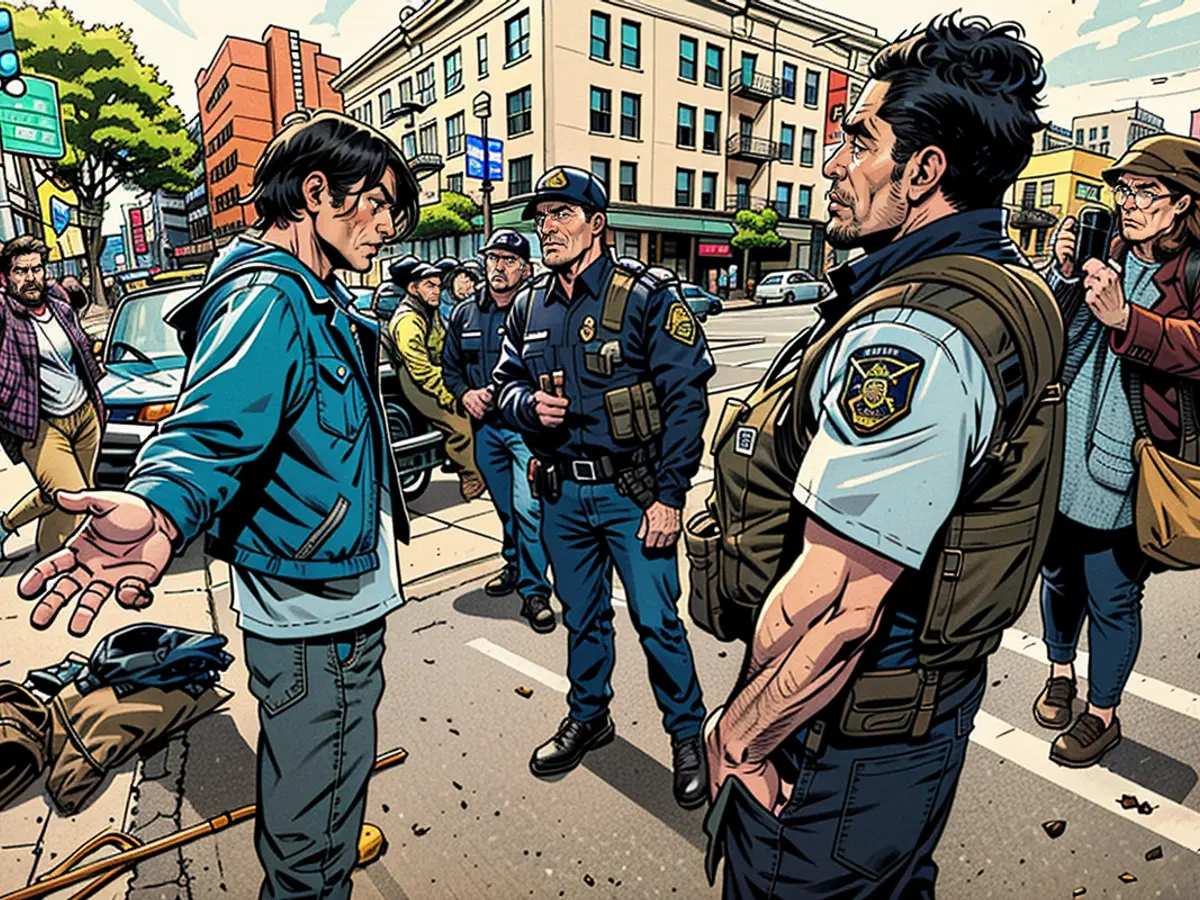
Unfortunately, with his papers discarded, he had to wait for his housing eligibility.
Frontline workers now dedicate a substantial amount of time and resources to helping people restore lost valuables such as medications, Social Security cards, and birth certificates as a result of raids. Patients often skip routine health care, and there has been an uptick in drug use, anxiety, and depression.
“Homelessness is just worsening,” said Evelyn Peña, a CalAIM care manager at the Mission Neighborhood Health Center in San Francisco.
Taylor Cuffaro, a nurse practitioner, and street medicine provider with the San Francisco Community Health Center, along with Eli Benway, a licensed clinical social worker providing talk therapy and behavioral health treatment on the street, searched the Tenderloin district one bright August afternoon.
Some patients required assistance managing chronic diseases and mental health problems. Others were due for long-lasting antipsychotic injections instead of pill medications. Some required refills of HIV medications.
“Insurance companies won’t just offer more medication,” Cuffaro said. “This simply isn't how it works, and people are truly in danger of dying sooner.”
Part of what's being wasted is trust, which is essential for getting people off the streets. “These raids are making our job nearly impossible,” Cuffaro said, struggling to find a patient in an alley.
Politics of Homelessness
This statewide crackdown continues despite a growing body of evidence demonstrating that offering comprehensive healthcare, coupled with social services and intensive case management, can successfully move homeless people off the streets and improve health, while also reducing taxpayer and healthcare spending on expensive institutional care.
Democrats are adopting a tough stance as public tolerance for the lingering issue diminishes. Governor Newsom's stance, however, is not entirely new: During his time as San Francisco mayor, from 2004 to 2011, he pioneered controversial homelessness initiatives, including an ordinance known as sit/lie, which made it illegal to sit or lie on public sidewalks.
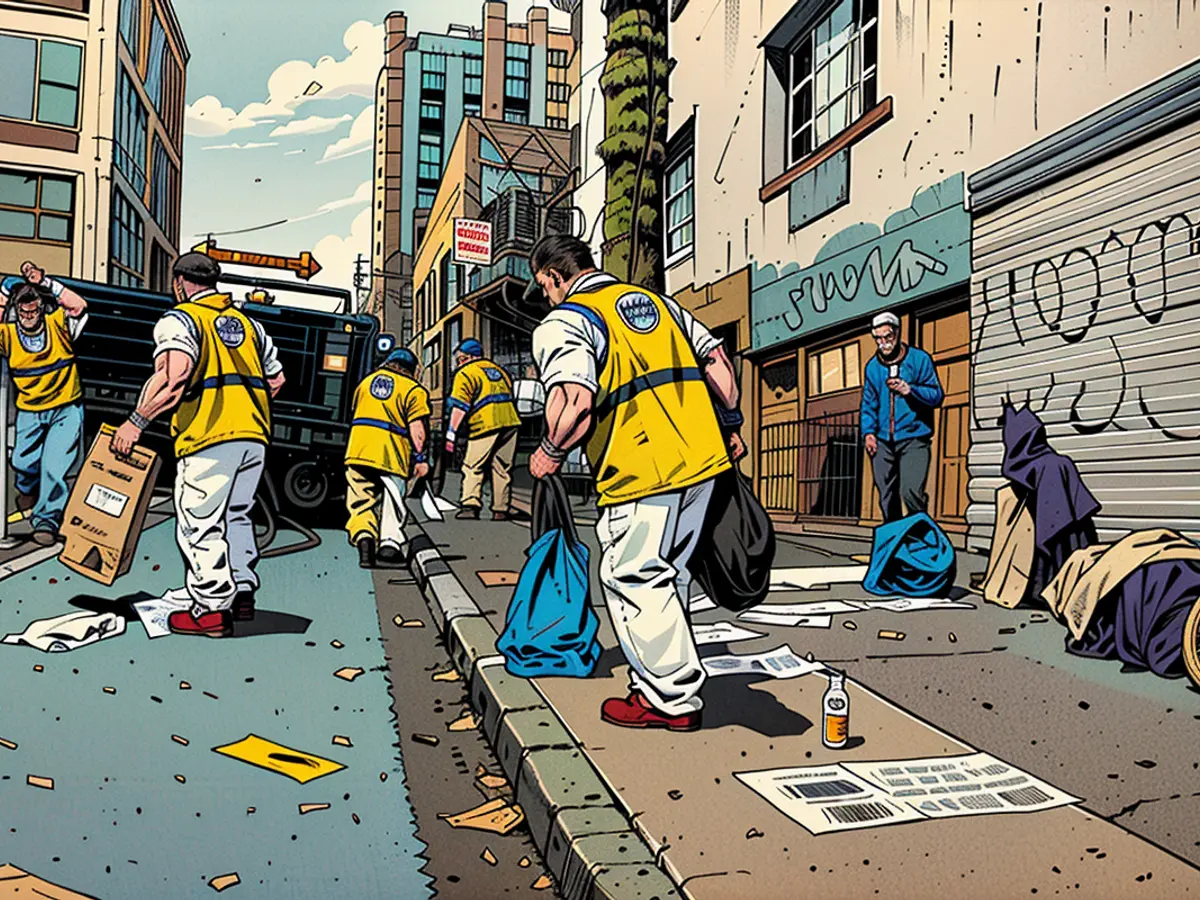
Newsom and local leaders, including Breed, claim that balance between ensuring public safety and clean streets with a compassionate approach to clearing camps while trying to get people indoors is crucial. Breed's administration officials argue that while some homeless individuals accept shelter, many prefer to stay on the streets while refusing treatment.
“People refuse shelter, and they won't adhere to their medical care or behavioral health treatment or anything else, often because they need to watch their belongings, some of which are filthy and becoming a health hazard,” said David Nakanishi, a clinical social worker who oversees the Breed administration's Healthy Streets Operation Center, leading the raids.
Meanwhile, in Los Angeles, street medicine provider Brett Feldman is losing his patients due to the raids. “This undermines our housing efforts,” he said.
Get CNN Health's weekly newsletter
- Sign up here to get The Results Are In with Dr. Sanjay Gupta every Tuesday from the CNN Health team.
A city report released in May found that clearing camps and enforcing anticamping laws, which ban people from sleeping, resting, or keeping belongings on sidewalks in specific areas, including school zones, parks, or freeway underpasses, was not effectively helping people into housing. After investing roughly $3 million in enforcing anticamping laws between 2021 and 2023, the report found that only two individuals were moved into permanent housing, and 81% of encampment sites were repopulated.
In one central Los Angeles district where law enforcement is not aggressively enforcing anticamping laws, street homelessness decreased roughly 38% in one year, from 2023 to 2024, said Indu Subaiya, interim CEO for the nonprofit Healthcare in Action, which has been housing and treating patients there.
“We're starting to see results and reductions in unsheltered homelessness,” Subaiya said. “However, in Southern California counties aggressively enforcing Newsom's executive order and clearing encampments, we're witnessing our patients and medical conditions taking considerable setbacks."
Upon Douglass's release, he was once again traversing the Tenderloin in search of lodging, setting up camp just a street away from his previous haunt.
"Each time I attempt to secure the necessary documents for housing, I get sent spinning back," he admitted. "It seems the city views us as if we're all perpetually shackled."
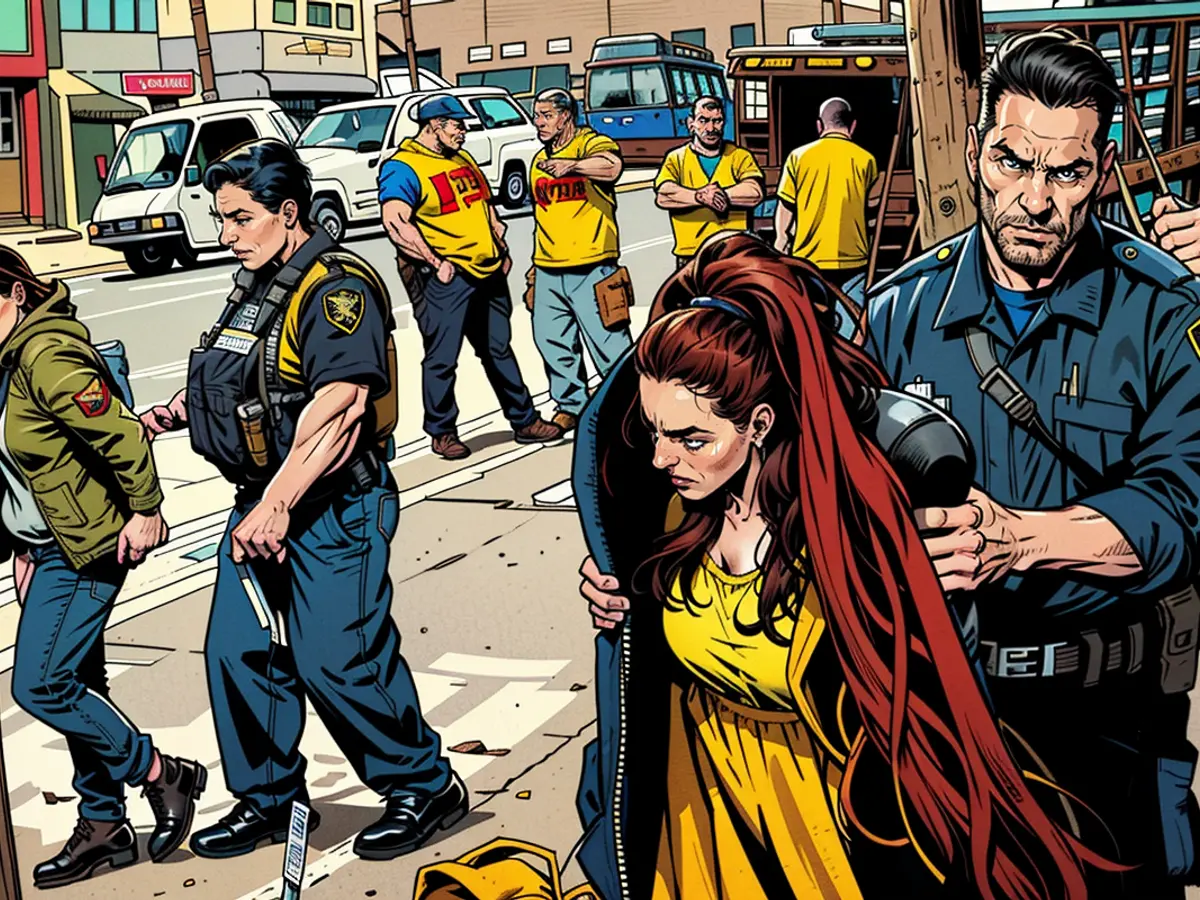
By the break of dawn, the makeshift settlement had more than doubled in size.
This article was produced by Health News from KFF, a central hub for in-depth exploration of health-related issues, serving as one of the key operational programs at KFF — an unbiased purveyor of health policy research, polling, and journalism. Health News from KFF is the mastermind behind California Healthline, an editorially independent arm of the California Health Care Foundation
Despite his concerns about losing his medications and vital documents, Douglass struggled to comply with the authorities' demands, as he needed to attend his crucial appointment with his street medicine case manager the following morning to secure low-income housing and support services.
Regrettably, after his arrest for illegal lodging, Douglas missed his appointment and faced delays in securing permanent housing due to the loss of his identification card, a vital document required for housing eligibility.
